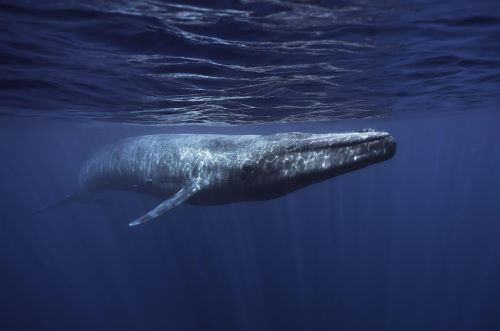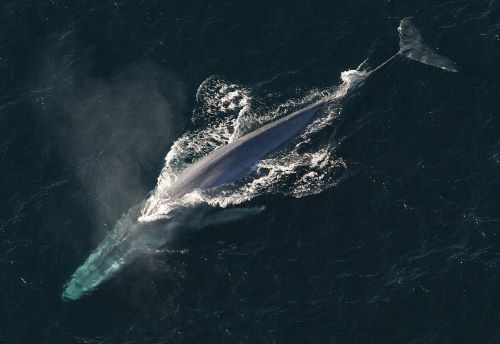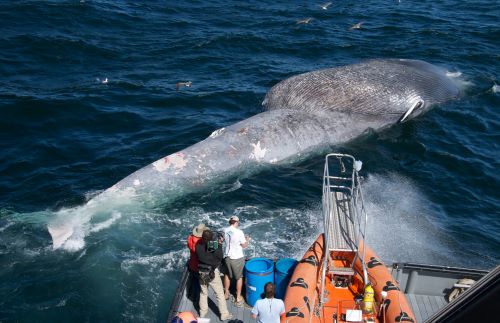

The question that remains is whether we are listening in time to respond. And whether the world we leave behind will still have room for giants that speak in songs we can no longer hear.

By Matthew A. McIntosh
Public Historian
Brewminate
A Vanishing Voice in the Deep
For centuries, the blue whale has loomed in the human imagination as a symbol of nature’s grandeur: immense, mysterious, unreachable. At up to 100 feet in length and weighing as much as 200 tons, it is the largest animal ever to exist on Earth. Yet its presence is often felt less through sight than through sound. The blue whale’s call, a deep and resonant moan, can travel across entire ocean basins. It is not just a mating song. It is, in some sense, a statement of existence.
Now, that voice is fading.
Across the globe, researchers are documenting a disturbing trend. Blue whales are calling less frequently and with reduced intensity. In the southern Indian Ocean, recordings have shown a steady decline in the tonal frequency of their songs since the 1960s. More recently, in regions like the South Pacific and parts of the Southern Ocean, researchers are reporting entire months where these vocalizations go nearly silent.
Silence in the sea may not register as alarm in the way wildfire or flood does. But to those who study the ocean, it is an unmistakable warning, one that points not only to the decline of an iconic species, but to a much larger unraveling of marine life beneath the surface.
Shifting Tones, Vanishing Songs
What is perhaps most striking about the silence is its subtlety. This is not a mass stranding or a beach littered with carcasses. It is an acoustic disappearance, a thinning of the soundscape that once filled the deep with rhythm and meaning.
The first signs of trouble were spectral. Oceanographers noticed that blue whale calls, traditionally recorded at around 20 Hz, were becoming lower in frequency. By 2015, these calls had dropped by nearly a full Hertz from their historical norms. This change was not just an oddity. It was a signal.
Marine biologists suggest several possible causes, all troubling. One theory is that decreasing whale population densities reduce the need to call as loudly or as often. Whales may simply not need to project their voices across vast distances if their potential mates are closer. That explanation, however, rests on the hopeful assumption that populations are recovering. More pessimistic interpretations suggest the opposite: that fewer calls may reflect stress, disruption, or disengagement within social structures.
Sound is the connective tissue of whale life. It governs everything from migration and feeding to breeding. When those sounds diminish or shift, it means something is breaking down.
The Weight of Noise

Among the most immediate threats to whale communication is the overwhelming surge in oceanic noise pollution. Cargo ships, sonar blasts, oil drilling operations, and military exercises have turned the seas into a cacophony of artificial sound.
The blue whale’s song evolved in an ocean that was, by human standards, profoundly quiet. That quiet has been shattered.
Unlike humans, whales do not simply raise their voices to compensate. Many species, including blue whales, appear to withdraw in the face of overwhelming noise. Some change their routes. Others dive deeper or delay vocalization until the noise subsides. In some regions, noise levels have doubled every decade since the 1950s, particularly in busy shipping corridors where blue whales still forage.
This chronic disturbance comes with physiological cost. Research has shown that persistent noise stress can elevate cortisol levels in whales, disrupt feeding patterns, and impair reproductive behavior.
Climate Change Beneath the Surface
Noise is not the only culprit. The warming of the oceans is transforming the acoustic environment in subtler, more insidious ways. As water temperatures rise, sound travels faster and with greater intensity. This can blur the spatial cues that whales rely on to locate each other, turning once-familiar sonic highways into echoing mazes.
At the same time, warming oceans affect the availability of krill, the primary food source for blue whales. Reduced feeding success can lead to weakened physical condition, delayed reproduction, and potentially less motivation to vocalize.
The reproductive cycle of blue whales is already among the slowest of any marine mammal. A female will gestate for nearly a year and then nurse a calf for up to eight months. She may not breed again for several years. If climate shifts disrupt this rhythm, recovery becomes painfully slow, if it is even possible.
The Memory of Whales

Whales carry cultural memory. Their calls are not mere instinct, but learned patterns passed through generations. Each population has its own dialect. Some scientists have likened these vocal cultures to oral traditions, songs that carry identity, history, and cohesion.
When a population falls silent, what vanishes is not just the animal, but its voice in time. We lose a thread in the long conversation of life.
In recent years, spectrograms of blue whale calls have begun to resemble ghost maps. Blank spaces where patterns once danced. Long silences where once there were vibrant choruses. The disappearance is not total, but it is accelerating.
In Chilean waters, blue whales are now heard only intermittently. Along the Californian coast, winter migrations, once rich with sound, have become acoustically barren. In parts of Antarctica, researchers report shifts in timing so extreme that peak vocal periods now occur months earlier than they did two decades ago.
Listening for What Comes Next
There is, for now, no single answer. Silence rarely provides one. But a growing network of oceanic listening stations is helping to build a clearer picture. Projects like the International Quiet Ocean Experiment aim to coordinate global efforts to reduce anthropogenic noise and study its impacts. Meanwhile, conservationists are pushing for speed limits on ships, seasonal route changes, and protected marine soundscapes.
Still, action has lagged behind evidence. The ocean is not a voting bloc. It does not protest in the streets. Its quiet is too easily ignored.
But silence, in this case, is not peace. It is erasure. The question that remains is whether we are listening in time to respond. And whether the world we leave behind will still have room for giants that speak in songs we can no longer hear.
Originally published by Brewminate, 08.04.2025, under the terms of a Creative Commons Attribution-NonCommercial-NoDerivatives 4.0 International license.


